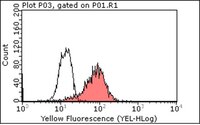04-1585 Sigma-AldrichAnti-IL-18 Antibody, clone 12E7.1
Anti-IL-18 Antibody, clone 12E7.1 is an antibody against IL-18 for use in IH, FC.
More>> Anti-IL-18 Antibody, clone 12E7.1 is an antibody against IL-18 for use in IH, FC. Less<<Recommended Products
Overview
| Replacement Information |
|---|
Key Spec Table
| Species Reactivity | Key Applications | Host | Format | Antibody Type |
|---|---|---|---|---|
| H, M | IHC, FC | M | Purified | Monoclonal Antibody |
| References |
|---|
| Product Information | |
|---|---|
| Format | Purified |
| Control |
|
| Presentation | Purified mouse monoclonal IgMκ in buffer containing PBS with 0.05% sodium azide. |
| Quality Level | MQ100 |
| Physicochemical Information |
|---|
| Dimensions |
|---|
| Materials Information |
|---|
| Toxicological Information |
|---|
| Safety Information according to GHS |
|---|
| Safety Information |
|---|
| Storage and Shipping Information | |
|---|---|
| Storage Conditions | Stable for 1 year at 2-8°C from date of receipt. |
| Packaging Information | |
|---|---|
| Material Size | 100 µg |
| Transport Information |
|---|
| Supplemental Information |
|---|
| Specifications |
|---|
| Global Trade Item Number | |
|---|---|
| Catalogue Number | GTIN |
| 04-1585 | 04053252629402 |
Documentation
Anti-IL-18 Antibody, clone 12E7.1 SDS
| Title |
|---|
Anti-IL-18 Antibody, clone 12E7.1 Certificates of Analysis
| Title | Lot Number |
|---|---|
| Anti-IL-18, Clone 12E7.1 - 4068662 | 4068662 |
| Anti-IL-18, clone 12E7.1 - 2142592 | 2142592 |
| Anti-IL-18, clone 12E7.1 - 2430982 | 2430982 |
| Anti-IL-18, clone 12E7.1 - 2201511 | 2201511 |
| Anti-IL-18, clone 12E7.1 - 2283350 | 2283350 |
| Anti-IL-18, clone 12E7.1 - 2332581 | 2332581 |
| Anti-IL-18, clone 12E7.1 - 3234492 | 3234492 |
| Anti-IL-18, clone 12E7.1 - 3425584 | 3425584 |
| Anti-IL-18, clone 12E7.1 - 3750062 | 3750062 |
| Anti-IL-18, clone 12E7.1 - 3876260 | 3876260 |
















